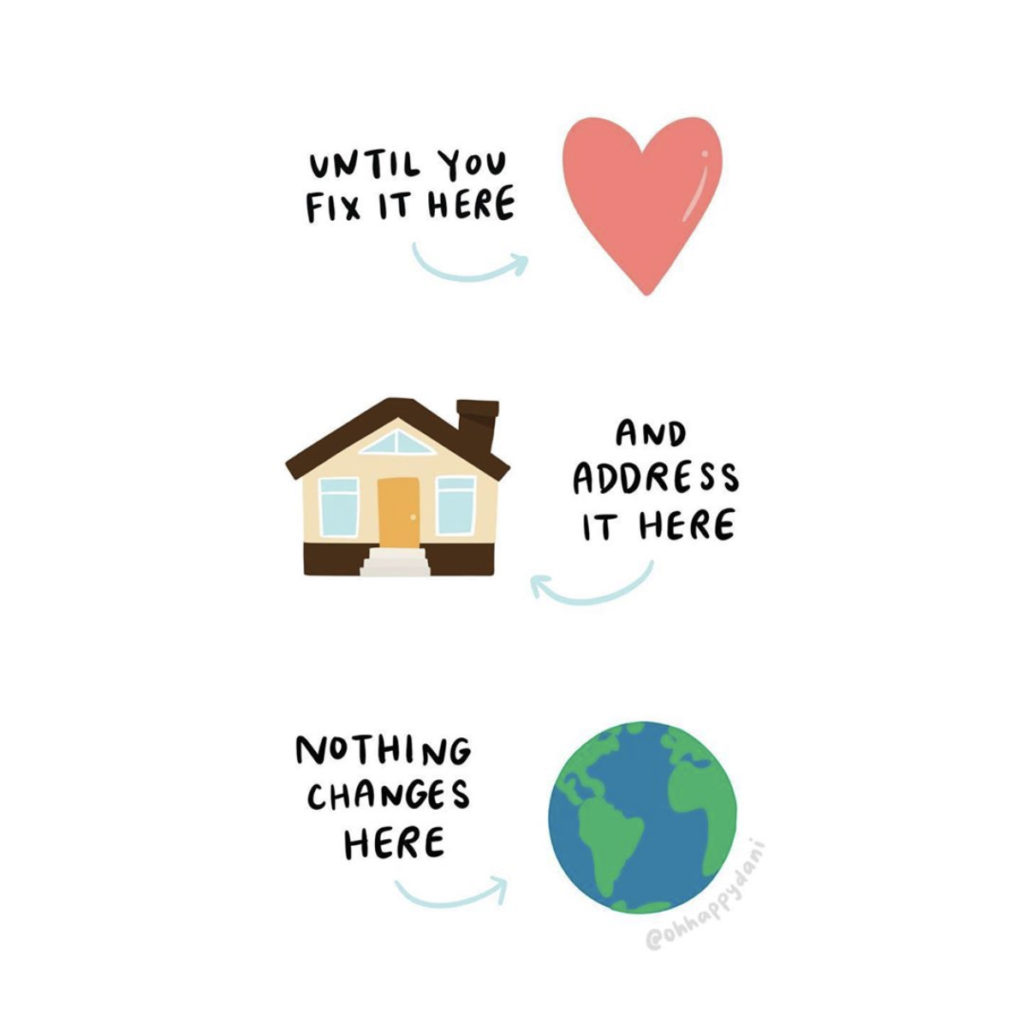
(Artwork by @ohhappydani – her account is a wealth of beautifully designed resources)
I had a call with a work mentor of mine yesterday to discuss ways in which I could be a better manager right now. And she said to me “It’s important to remember – we’re all in the same storm, but some of us are in the boat and some of us are in the water”. And it’s so true. We’re all feeling the heaviness of the world right now, but Black people have been unjustly shouldering the heaviness of it for their entire lives (and their families lives before them). It’s our job to fix the system so that we are finally all paddling in the same boat.
It’s safe to say that many of us have acknowledged that responsibility this week – and that’s great. We no longer simply want to be passively “not racist” but instead, actively “anti-racist”. So what can you do in order to become a lasting ally to Black people – not to mention all other non-white people and LGBTQIA+ communities? Well, I’m certainly not an authority on the matter but below is my four part plan. I’ve put these steps together for myself this week after leaning heavily on resources from @therealkamie @theconsciouskid and @nicolettemason among many others. The work is long overdue in this country, and frankly I haven’t been doing nearly enough of this active work when I had every opportunity to. And it doesn’t end today.
- Admit your inherent privilege. White privilege doesn’t mean your life hasn’t been hard – it means that your skin color isn’t one of the reasons that it’s been hard. Read that again if you need to. Same goes for if you’re straight or Christian. If you’ve never been discriminated against because of your race, sexual orientation, religious beliefs, etc. – you have privilege. Let’s admit that and move on to step 2.
- Commit to adding diversity into your daily life so that you can learn to understand and empathize with stories that look different than your own. This can be in everything from the books you read and the accounts you follow on Instagram to the people that you hire and connect with socially and the businesses where you shop. Essentially, make sure they all don’t look like you and come from the same background as you do.
- Become an active ally. Using your privilege and the understanding that you’ve cultivated – listen closely to these communities when they call out for help. Be vocal in speaking up when there is injustice – both in large, systemic ways by using the power of your vote or in small ways like when someone in your family or office uses hateful speech. Even if it’s thinly veiled as a “joke”. Don’t stand for it. Speak clearly, look them in the eyes and tell them that their statements make you feel uncomfortable and would make X group feel less than. Is that their intention? Beyond your voice, donate your time and your resources to organizations that support these causes.
- Raise the next generation differently. Studies prove that children begin to absorb bias at an incredibly young age. They watch you closely to understand how they are meant to act and it’s never too early to start teaching them lessons of equality. Just like you diversified your life in step 2 – do the same for them. Buy dolls that look differently than them, buy books that show different lifestyles and cultures, speak openly and honestly in support of these sentiments. Raise them to be the next generation of allies.
There are a wealth of resources on all of these (I found this round-up to be helpful), but I want to specifically speak more to #2 on how to further diversify your life in a way that feels personal to me. Reading has always been a way for me to personally connect with worlds beyond my own. It’s important to read non-fiction to understand the full history of oppression, struggle and systemic issues that you might not have learned in school and to understand people’s unique experiences. It’s also important that you read fiction from Own Voices (meaning if it’s a story about a queer protagonist it’s been written by a queer author, if it’s a story about the life of a Black woman it’s been written by a Black woman). I think non-fiction often helps us to better understand our differences and fiction can be a great way to connect with the similarities (for example: if the characters in a romantic fiction novel are Black or Gay or Trans, the focus is a love story.. same as if the characters were white/straight).
I’m personally planning to be sure that my shelves look much more diverse. I had originally posted the 15 books on my Summer Reading List but there are not nearly enough own voices and stories that focus on BIPOC or LGBTQIA+ lives there. So I’m adding 10 more to that list.
- The Nickel Boys by Colson Whitehead
- Born a Crime by Trevor Noah
- Sissy by Jacob Tobia
- Girl, Woman, Other by Bernadine Evaristo
- Boys of Alabama by Genevieve Hudson
- Felix Ever After by Kacen Callender
- All Boys Aren’t Blue by George M. Johnson
- An American Marriage by Tayari Jones
- The Vanishing Half by Brit Bennett
- Between The World and Me by Ta-Nehisi Coates
If you’re looking for more, here is a list of anti-racist books to further your education and here is a list by age group of books that address race for children and teens. While you’re at it – consider forgoing Amazon to order from one of the independent bookstores below.
- A list of Black owned bookstores by states: here.
- In NYC, I’ve already placed an order from The Lit Bar and plan to order from Sisters Uptown next.
- Here is a list of LGBTQIA+ owned indie bookstores by country and state.
- In NYC, I look forward to visiting Bluestockings when things reopen.
I can do better. We can all do better. Let’s get started.

